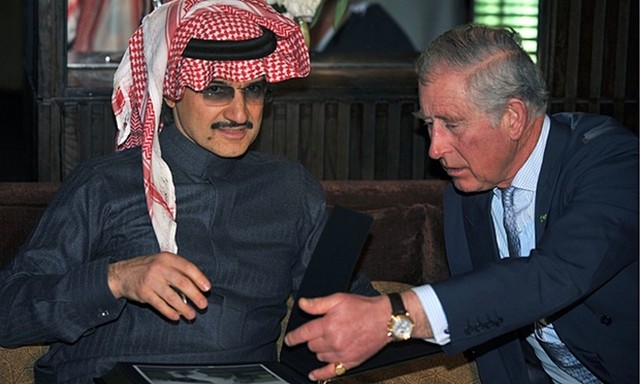By Rupert Neate
The British defence firm BAE Systems has finally agreed to a deal on the price of 72 Eurofighter Typhoon jets it is selling to Saudi Arabia following years of fraught negotiations.
Saudi Arabia initially agreed on a £4.4bn price-tag for the aircraft in 2007, but BAE tried to extract more money after the Saudis requested advanced weaponry and equipment for the jets, which are being built in Warton, Lancashire.
The so-called Salam deal, negotiated between the Saudi and UK governments, was announced on Wednesday during Prince Charles’s visit to the country. The prince’s spokeswoman said that BAE “did not come up in any of his conversations” with the Saudi royal family and politicians, including the deputy prime minister, Muqrin bin Abdulaziz.
The Typhoon deal became politically sensitive when it was revealed that Tony Blair, as prime minister, put pressure on the attorney general to drop a fraud inquiry into BAE’s previous sale of Tornado combat jets to Saudi Arabia.
BAE refused to state how much Saudi Arabia had now agreed to pay for the jets, but said it expected a “cash settlement” in the next few months. More than 30 of the jets have already been handed over.
Ian King, BAE’s chief executive, said: “This is an equitable outcome for all parties. I am pleased that we have been able to conclude this negotiation which builds on our long-standing relationship with this much valued customer.”
BAE had warned that any further delays with the deal would knock about 15% off its earnings per share.
The Saudi deal conclusion comes three months after BAE lost a proposed £6bn agreement to sell 60 of the jets to the United Arab Emirates, despite the personal intervention of David Cameron. The prime minister made two trips to try to persuade the UAE to sign the deal and pleaded the company’s case with Sheikh Mohammed bin Zayed Al Nahyan, crown prince of Abu Dhabi.
The signing of the Saudi deal was welcomed by analysts who said it could help BAE make further inroads in the region. “There is considerable relief that this long-running problem has been resolved,” said Howard Wheeldon, an independent defence analyst. “It does open up some very interesting doors, not only in Saudi Arabia, but across the Arabian peninsula.”
Bahrain, Qatar and Malaysia are also considering buying the Typhoon rather than competitors such as the Lockheed Martin F-35 made in the US, France’s Dassault Aviation Rafale fighter, and the Gripen from Sweden’s Saab. Oman agreed in 2012 to buy 12 of the jets.
Robert Stallard, analyst at RBC Capital, said: “With Salam cash coming in, this should give BAE more flexibility for cash deployment moving forward. It also allows the Kingdom of Saudi Arabia to move on to other potential agreements.”
The money from the Saudi Typhoons will help BAE complete its pledge to return cash to shareholders by buying up £1bn of its shares.
BAE’s shares spiked in early trading at the announcement but later dropped back, to end the day down 0.8p to 436.8p.
The company, which has been affected by governments around the world cutting back on defence spending, is on Thursday expected to report a 9% increase in annual profits to £1.8bn, according to analysts at the investment bank Deutsche Bank.
Rolls-Royce, a rival, shocked investors last week when it warned that there would be a “pause in revenue and profit growth” after cuts in defence spending. More than £3bn was wiped off the company’s share price after it called an end to a decade of revenue growth.
BAE builds the Eurofighter alongside the European aerospace group Airbus and Italian defence contractor Finmeccanica.
19 February 2014

